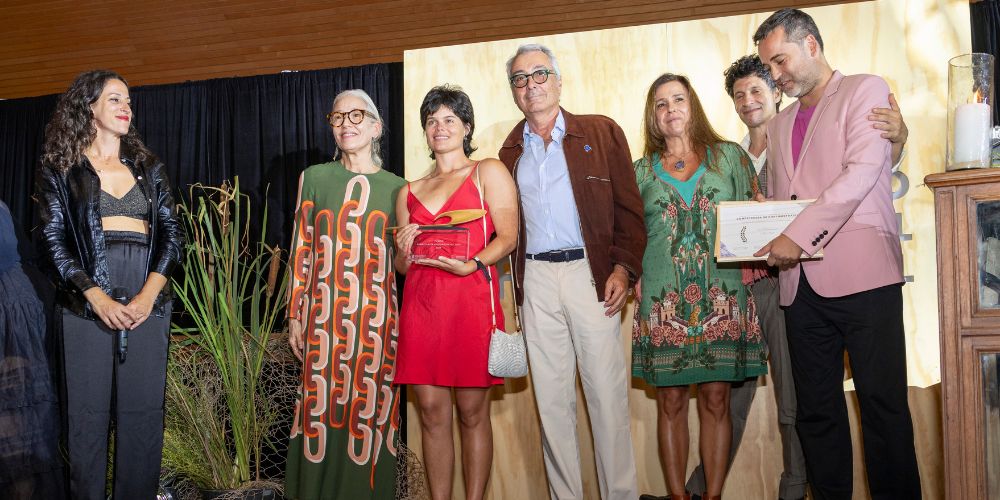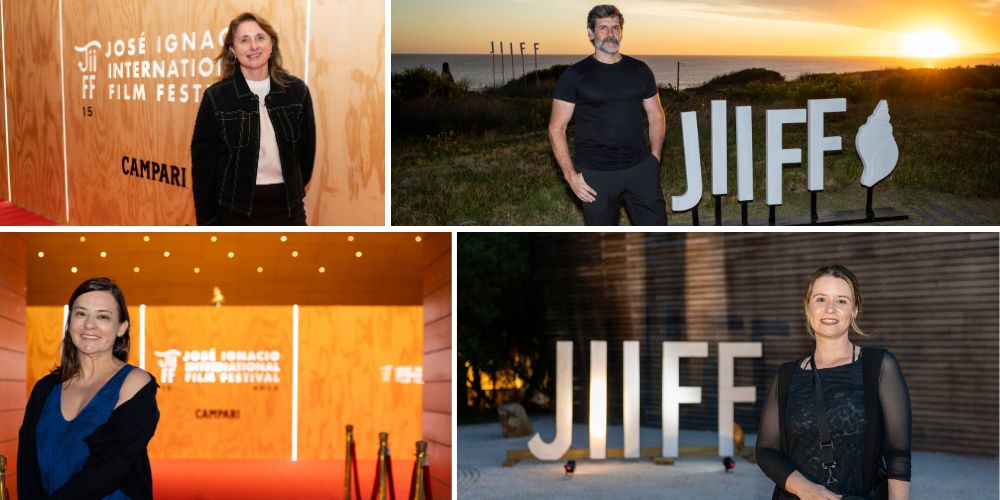- Home
- About us
- News
- Events
- EXPORT Export
-
BUY
Buy
Buy
- INVEST Invest
- COUNTRY BRAND Country Brand
-
INFORMATION CENTER
Information center
InformationCenterInformationCenterReports Country reports Department reports Foreign trade reports Product-Destination worksheet Sectors reports Work documentsStatistical information Classification Uruguay XXI Exports Imports Innovative National Effort Macroeconomic Monitor Tools Buyers Exporters Investors
- Contact
-
Languages
JIIFF: Elevating Uruguay's Profile on the International Film Stage
Celebrating its 15th anniversary, the José Ignacio Film Festival has garnered praise from international guests, highlighting Uruguay's potential to become a prominent film hub
Share:

For the fifteenth consecutive year, the José Ignacio International Film Festival (JIIFF) has transformed the quiet coastal town of José Ignacio into a hub for international cinema. With its intimate and exclusive format, open-air screenings, and an expanding industry space, the festival has established itself as a key reference point for both regional and global filmmaking. The 2025 edition was supported by Uruguay XXI, which helped facilitate the arrival of notable guests, including British journalist Chris Cotonou, Renata de Almeida, the director of the Mostra Internacional de Cine de São Paulo and a jury member of JIIFF Lab, as well as Cristiane Guzzi, the project advisor for the same initiative.
A Festival with a Unique Identity
Pablo Mazzola, the founding partner of JIIFF, expressed that the festival has experienced remarkable growth. “Fifteen years ago, we started with a simple screening by the sea, and today we have 2,000 attendees choosing this festival to engage with cinema,” he stated.
Mazzola emphasized that the festival has become not just a meeting point for the industry but also a training ground for new generations. This is evident through initiatives like Generation J, a program designed for young filmmakers up to 32 years old, and JIIFF Lab, a development laboratory for Ibero-American projects at various stages of production. These operate within the Working JIIFF framework, which facilitates connections among professionals in the audiovisual sector.
Additionally, the festival has made significant strides toward internationalization. This year, its Uruguayan short film competition was recognized as a qualifying festival for the Academy Awards, a milestone that enhances the event's global significance. “That the Oscars are paying attention to us means that Uruguay is on the radar of the film world,” Mazzola remarked.
One success that highlights the festival's impact is the short film Carlota, which began in Generation J and went on to win in both the official short film section and the audience award. This achievement illustrates the evolution and growth of the talents that have emerged from JIIFF. Furthermore, this success affords the short film an automatic opportunity to be considered for inclusion on the shortlist for the Best Short Film category at the Oscars in 2026.

Another notable development in this edition of the festival was the introduction of the Pfeffer del Sur Fund, which offers a private investment of USD 50,000 for audiovisual projects in the region. Victoria Alonso, a former executive at Marvel Studios and producer of the film 1985, who served as a jury member at the festival this year, highlighted the importance of such incentives. “This fund is significant because it is the most generous in the region. It serves as a great attraction for filmmakers to present their projects here and contributes to the internationalization of Uruguayan cinema,” she stated.
Chris Cotonou, deputy editor of the British magazine A Rabbit's Foot, echoed this sentiment, noting that financial support is crucial for promoting Uruguayan cinema. “I’m more eager to see the results of the Pfeffer Fund and Generation J than to know which film won the festival. Uruguayan filmmakers are incredibly talented, and even if they don’t win the fund, I’m confident they will create their films and showcase them at international festivals,” he said.For Pablo Mazzola, founding partner of JIIFF, the festival's growth has been exponential. “Fifteen years ago we started with a simple screening by the sea and today we have 2,000 people choosing this festival to meet with cinema,” he said.
“Uruguay can become a film destination.”
Cotonou discovered Uruguay for the first time and was amazed by its natural beauty and hospitality. “José Ignacio is the most beautiful beach town I have ever visited in my life,” he said. In addition to the cuisine and the warmth of the Uruguayans, what impressed him most was the country's emerging film community.
“I think this festival is really special because it allows direct interaction between producers, directors and actors. It's not like Cannes, where there are a hundred people between you and whoever you're interested in meeting. Here it's much more relaxed and close,” he stressed.
Cotonou also highlighted Uruguay's potential as a filming destination. “If someone wants to make a film by the sea, this is the place. It has an impressive infrastructure and the nature is spectacular. Uruguay has everything to become a film pole.”

The director of the São Paulo International Film Festival, Renata de Almeida, and project advisor Cristiane Guzzi, highlighted the importance of strengthening ties between the two countries. “Brazil has always had many co-productions with Uruguay, but this approach could be even greater. We are working on that,” said Guzzi.
De Almeida highlighted the technical quality of Uruguayan equipment and the interest of Brazilian productions in filming in the country. “Many productions come here to do the technical and service part, such as Netflix's Senna series and Prime Video's El Presidente, which took advantage of the technical excellence that is a reference in the region,” he said. He also announced that the São Paulo Mostra will invite two projects selected at the Working JIIFF to promote co-productions between the two countries.
Uruguay: an up-and-coming film jewel
The consensus among the international guests was clear: Uruguay has everything to become a cinematographic pole of reference. Cotonou highlighted the intelligence and creativity of Uruguayan filmmakers. “Talking to them, I felt that in five or ten years they are going to be true giants of cinema,” he reflected.
For Renata de Almeida, the country's lack of bureaucracy and stability are great advantages. “Uruguay is a unique country in Latin America. Here foreign productions find fewer obstacles and more flexibility to work,” she celebrated. Victoria Alonso reinforced this point by highlighting that “Uruguay not only has technical and creative talent, but also spectacular locations and unbeatable weather conditions. In addition, its stability and the absence of natural disasters make it an ideal destination for international productions.
The José Ignacio International Film Festival has once again demonstrated its ability to attract top-notch talent and position Uruguay on the world film map. With its exclusive character, its paradisiacal setting and its growing influence in the industry, the festival continues to consolidate itself as a space where cinema and creativity meet at their maximum expression.
“The JIIFF has everything to continue to grow and become the film destination of South America,” concluded Cotonou.
